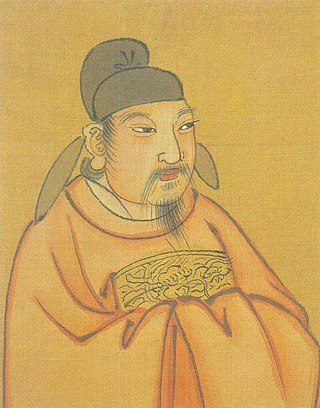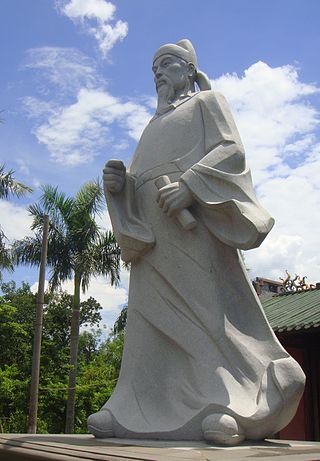
Emperor Dezong of Tang, personal name Li Kuo, was an emperor of the Chinese Tang dynasty and the oldest son of Emperor Daizong. His reign of 26 years was the third longest in the Tang dynasty. Emperor Dezong started out as a diligent and frugal emperor and he tried to reform the governmental finances by introducing new tax laws. His attempts to destroy the powerful regional warlords and the subsequent mismanagement of those campaigns, however, resulted in a number of rebellions that nearly destroyed him and the Tang dynasty. After those events, he dealt cautiously with the regional governors, causing warlordism to become unchecked, and his trust of eunuchs caused the eunuchs' power to rise greatly. He was also known for his paranoia about officials' wielding power, and late in his reign, he did not grant much authority to his chancellors.

Emperor Xianzong of Tang, personal name Li Chun, né Li Chun (李淳), was an emperor of the Chinese Tang dynasty. He was the eldest son of Emperor Shunzong, who reigned for less than a year in 805 and who yielded the throne to him late that year.
Emperor Shunzong of Tang, personal name Li Song, was an emperor of the Chinese Tang Dynasty. He was created crown prince in 779 and became emperor in 805 after the death of his father Emperor Dezong, of whom he was the oldest son. His reign lasted less than a year, as, due to his illness, the powerful eunuchs were able to get him to approve a transfer of the throne to his son Li Chun, who took the throne as Emperor Xianzong. Emperor Shunzong was honored with the title of Taishang Huang. He died in 806, with some later historians suspecting that he was murdered by the eunuchs who arranged for Emperor Xianzong's succession.
Du You, courtesy name Junqing (君卿), formally Duke Anjian of Qi (岐安簡公), was a Chinese historian, military general, and politician. He served as chancellor of the Tang dynasty. Du was born to an eminent aristocratic family in what is now Xi'an, Shaanxi, almost eighteen years before the abrupt rebellion of An Lushan, and received office for the privilege as administrator of Chi-nan commandery. Robert G. Hoyland considers him a "political thinker on a grand scale," comparable to Ibn Khaldun, but he is most often remembered for his thirty-six year compilation of the Tongdian, a historical encyclopedia of 200 sections (volumes) collecting laws, regulations, and general events from ancient times to his own.
Li Fan (李藩), courtesy name Shuhan (叔翰), was an official of the Chinese dynasty Tang dynasty, serving as a chancellor during the reign of Emperor Xianzong.

Wei Zhiyi (韋執誼) was a Chinese historian and politician during the Tang dynasty, serving briefly as chancellor in 805, during the brief reign of Emperor Shunzong and then briefly into the reign of Emperor Shunzong's son Emperor Xianzong. He came to power due to his association with Emperor Shunzong's close associate Wang Shuwen but later broke with Wang; he was nevertheless exiled once Emperor Xianzong became emperor due to his prior association with Wang and died in exile.
Liu Pi (劉闢), courtesy name Taichu (太初), was a Chinese military general, poet, politician, and rebel during the Tang dynasty. Early in the reign of Emperor Xianzong, he resisted imperial authority at Xichuan Circuit, and was defeated by imperial forces commanded by Gao Chongwen and executed.
Yuan Zi, courtesy name Deshen (德深), formally the Duke of Huaiyang (淮陽公), was an official and general of the Chinese Tang dynasty, serving briefly as chancellor during the reigns of Emperor Shunzong and Emperor Xianzong.
Wei Gao (韋皋), courtesy name Chengwu (城武), formally Prince Zhongwu of Nankang (南康忠武王), was a Chinese military general, monarch, and politician of the Tang dynasty. He was a long-time military governor (Jiedushi) of Xichuan Circuit who was most known for his campaigns against Tibetan empire and his reopening of relationship between Tang and Nanzhao.
Wang Shuwen was a Chinese economist and politician during the Tang dynasty. He was a close associate of Emperor Shunzong while Li Song was crown prince under his father, Emperor Dezong, and was powerful during Emperor Shunzong's brief reign in 805, when Shunzong was severely ill. However, he offended the powerful eunuchs and further lost power when he was forced to leave governmental service due to his mother's death, and after Emperor Shunzong yielded the throne to his son Xianzong, Wang was ordered to commit suicide.
Li Qi was a military governor (Jiedushi) of the Chinese Tang Dynasty, governing Zhenhai Circuit. In 807, he rebelled against the authority of Emperor Xianzong, but he was quickly defeated and captured by his own subordinates who turned against him, and he was delivered to the capital Chang'an and executed via waist chop.
Gao Chongwen, formally Prince Weiwu of Nanping (南平威武王), was a Chinese military general, monarch, and politician during the Tang Dynasty, most well known for his defeat of the warlord Liu Pi.
Zheng Yin (鄭絪), courtesy name Wenming (文明), was a Chinese historian and politician during the Tang dynasty, serving as a chancellor during the reign of Emperor Xianzong.
Wu Yuanheng, courtesy name Bocang (伯蒼), formally Duke Zhongmin of Linhuai (臨淮忠湣公), was a Chinese poet and politician during the Tang dynasty, serving as a chancellor during the reign of Emperor Xianzong. Wu descended from a family of officials related to Empress Wu Zetian of Zhou and rose in the Tang bureaucracy during Emperor Dezong's reign, holding senior positions in the provinces and at court. After Dezong's grandson Xianzong ascended the throne, Wu became a chancellor and later served with distinction as governor of Xichuan Circuit in modern Chengdu, where he was a patron of the eminent poet Xue Tao. He returned to court in 813 to serve as chancellor and director of the examination bureau, and in that capacity supervised the court's campaign against the Henan warlord Wu Yuanji. On July 13, 815, Wu was assassinated in the imperial capital of Chang'an by agents of Wu Yuanji's ally Li Shidao, the military governor of Pinglu Circuit in Shandong.
Li Jifu (李吉甫), courtesy name Hongxian (弘憲), formally Duke Zhongyi of Zhao (趙忠懿公), was a Chinese cartographer, historian, and politician during the Tang Dynasty, serving as a chancellor during the reign of Emperor Xianzong.
Zhang Hongjing, courtesy name Yuanli (元理), formally the Marquess of Gaoping (高平侯), was an official of the Tang dynasty of China, serving as a chancellor during the reign of Emperor Xianzong. He was blamed in traditional histories for misruling Lulong Circuit, leading to Lulong soldiers' subsequent rebellion against the imperial government under Zhu Kerong.
Cheng Yi (程异), courtesy name Shiju (師舉), was a Chinese economist and politician of the Tang Dynasty, serving as a chancellor during the reign of Emperor Xianzong. Like colleague Huangfu Bo, he was perceived to have risen to the chancellorship due to his ability to obtain revenues for the emperor, but unlike Huangfu, traditional accounts of his personal character were largely positive.
Han Hong, formally Duke Yin of Xu (許隱公), was a general of the Tang dynasty of China, who also served as a chancellor during the reigns of Emperor Xianzong and Emperor Xianzong's son Emperor Muzong.
Du Yuanying, formally the Baron of Jian'an (建安男), was an official of the Chinese dynasty, serving as a chancellor during the reign of Emperor Muzong. His policy error while being chancellor was blamed for the imperial government's losing control over the circuits north of the Yellow River. While later serving as the military governor (Jiedushi) of Xichuan Circuit, he was further blamed for failure of discipline that caused his soldiers to provoke a major Nanzhao invasion against Xichuan, leading to his exile.
Du Cong (杜悰), courtesy name Yongyu (永裕), formally the Duke of Bin (邠公), was an official of the Tang dynasty of China, serving two terms as chancellor during the reigns of Emperor Wuzong and Emperor Wuzong's cousin Emperor Yizong. He was traditionally considered a skilled politician who maintained his high position throughout his lengthy career, but not a capable chancellor.